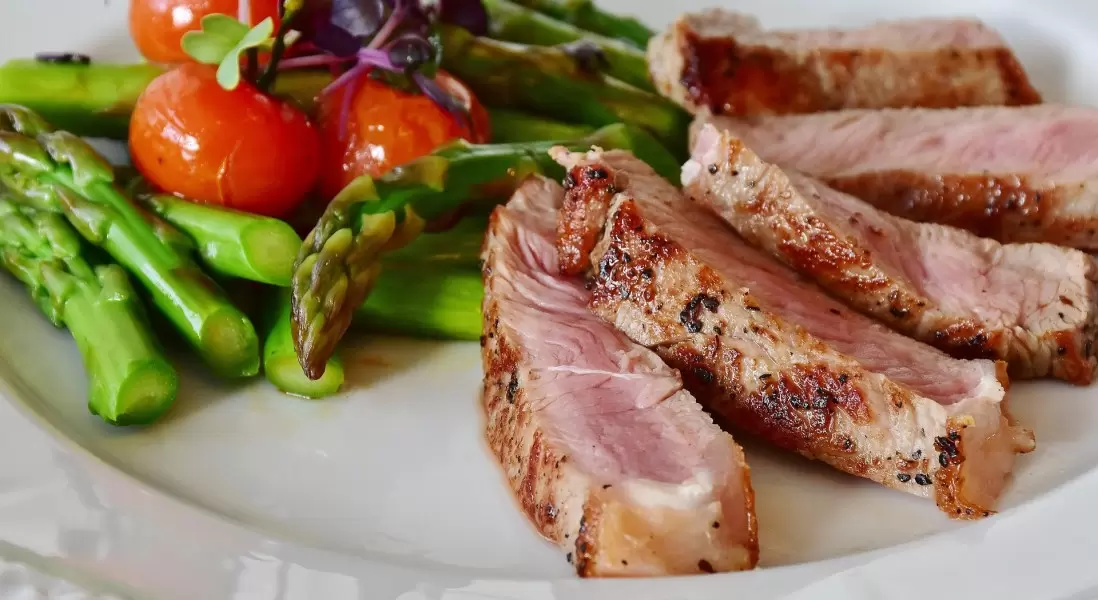Our goal was to find out what impact food has on climate. We have worked on this goal by researching, living vegetarian and doing a survey with our family.
What is the current state of climate change?
The temperature of our earth has risen about one degree*). For this reason polar ice is melting, sea levels are rising, animal species are going extinct and there are a lot of natural disasters. Climate change respectively global warming is a direct result of human activities which began during the Industrial Revolution.
*) Global warming is defined as an increase in combined surface air and sea surface temperatures averaged over the globe and over a 30-year period (ippc.ch)
Impact by food
Even if we can’t see it immediately; our eating habits have big effects on our environment, especially the climate change. This is due to the manufacturing of the food. To produce food, we need acreage (Anbaufläche), water and a lot of energy, especially to produce the food for the animals we eat later. Energy is also used for the delivery by truck over long distances. About 13% of the CO2 is emitted because of our food consumption. If we think about how many people we are on earth, it’s a huge difference on how we produce our food. More than 427’000 tons of meat were consumed in 2017 in Switzerland and 67% of the agricultural (=landwirtschaftlich) landscape was used for our food. [Do these statistics take imported animal feed into account?]
Our food respectively agriculture contribute more to climate change than transportation [Isn’t it linked as much food and feed is possible due to global transport chains?]. Animal agriculture is the leading cause of species extinction and ocean dead zones. It is recommended to reduce consumption of meat, cheese, butter and milk to reduce CO2 emission. For cattle countless acres of land are being destroyed (e.g. the Amazon rainforest) and the home of a lot of animal are being destroyed too. But also a lot of carbon dioxide (=Kohlendioxid) is released into the air. Livestock (Viehzucht) is responsible for 57% of water pollution, 56% of air pollution and a third of the fresh water in the world is being used.
For one kilogram of meat we need about 15’400 liters of water. That’s why a lot of groundwater has to be used.
The import and export of food effects our environment as well. Fruits as mango or avocado or in general coffee beans can’t be grown in Switzerland. That is the reason why we need to import them from abroad.
Beef, lamb, pork, turkey, chicken, farmed salmon, canned tuna and eggs are the most harmful for our climate. However lentils, tomatoes, dry beans, tofu, broccoli, nuts, rice, potatoes, green peas, amaranth and oranges are the best for our climate.
How can we help our climate?
If you changed just 30% of your food (that means from animal products to plant-based foods) it would be effective.
You should buy regional and seasonal products, support organically grown produce. People say “The more food miles traveled, the bigger the carbon footprint.”
Waste less food! Plan your purchases before shopping.

Survey with our family
As we have announced before, we have done a survey with our family. The families were divided into younger generation (siblings) and older generation (parents).
These are the questions we have asked:
1. What contributes more to climate change? Agriculture or transportation?
2. How much food end up in the waste bin?
3. How much has the earth warmed up in the past few years?
4. What should you reduce to reduce the CO2 emission?
5. What do you think is the most harmful for our climate?
6. What do you think is the best for our climate?
7. Do you eat meat?
8. Would you change your eating habit to save the planet?
9. If you reduced just 30% of your meat consumption it would be effective. Would you do that?
10. When you’re buying food, what do you have to pay attention to?
11. Do you have another opinion on this topic after this survey?
12. Are you now aware of how important this topic is?
Both generations think that transport (e.g. cars) contributes more to climate change than agriculture, which is not true. It is estimated that about 3 million tons of food ends up in the trash can. Regarding climate change, the younger generation thinks that the earth has warmed up by about 3 degrees. The older generation says it’s about 1.5 degrees. We have asked our family what should be reduced to reduce CO2 emissions. The same answer was meat, although the younger generation also thinks that one should not consume fast food and avocado. The younger generation thinks that avocado, meat, fast food and chemical products are the worst, but strawberries, salad from our own garden and organic products are best for our climate. Older people mention that meat is worst and vegetables, fruits and nuts are best. Both families eat meat regularly, but can still imagine reducing or even doing without meat. If one would reduce only 30% of the meat consumption, this would help the climate. All people would be ready for it. In the future, they will try to pay attention to where the food is from and would therefore prefer products from the region. The younger generation did not have a different opinion according to this survey, but the older generation did. All of them are aware of the importance of the topic.
Living vegetarian for one week – Our experience
With this project, we’ve learned a lot about how meat can affect our climate. Neither of us would completely live without meat. However, reducing the consumption is a great idea to support the environment. To experience, if it’s feasible (machbar) for us to live without it, we lived as a vegetarian for one week. These are our experiences:
At the beginning we thought about our menus, but it was very easy. In every restaurant and supermarket, there are enough menus for vegetarians, which is great. Small snacks could easily be replaced with fruits or nuts for example. In general, Deniz longed more for meat than Maria did.
It would be very interesting to live vegetarian for more than just one week. Maria would really like to do it, especially to see how it would affect our body, besides the environment. Deniz couldn’t imagine to live as a vegetarian for a longer time, because in her opinion, there are a lot of important vitamins in meat and it’s tasty as well.
Even though we’ll still eat meat after this little project, we thought and talked a lot about the animals. In order to that, we could both imagine to reduce the amount of meat we eat, which in our opinion is a great first step towards the environment.
Sources
Wie unser Essen das Klima beeinflusst (Energie-tipp.de), anonymous, June 2015
Which foods are the most damaging to the planet? (foodrevoultion.org), Ocean Robbins, April 2019
Was hat mein Essen mit der Umwelt zu tun? (oekoleo.de), anonymous, November 2017
Welche ökologischen Auswirkungen hat der Fleischkonsum? (swissveg.ch), anonymous, July 2019
cover picture (xtalks.com)
Reviewer: Elias Bai (Maria’s brother)
Here you can find some other interesting links concerning this topic:
Proof that agriculture is more burdensome than transportation (thegurdian.com), Damian Carrington, July 2014
What’s your diet’s carbon footprint? (bbc.com), Nassos Stylianou, Clara Guibourg and Helen Briggs, August 2019
Thank you for reading!
Deniz and Maria
On-topic posts on dontwastemy.energy
How much energy is embedded in agricultural products?
Sustainable Food
Long-Distance Heating
The life cycle of bread
The Beef Cycle
Chicken consumption
Maritime Transportation Challenges
☷ See the project teams here »
☵ Some words about the contributions »
☴ Our sponsors and partners » (the-horse.education)

Hello Deniz and Maria
I really enjoyed reading your article because it gave me new insights about the impact on climate by food. I really like that you shared your experience about living like a vegetarian for a week. I might try it too sometime.
I think you did a great job!
Regards,
Alicia
Hey you,
First of all, you have choosen a very interesting topic. I really like that you did your own experience and shared them with us. The whole project is very well created.
You did a really good job.
Best wishes.
Selina
Hello Maria and Deniz
You’ve choosen a really nice topic. It was really interesting to read it. Your project is very diversified and that is what it makes very fascinating. What I like the most is that you live as a vegetarian for one week and that you made a survey with your families.
Best wishes,
Julia
Dear Deniz and Maria,
I really enjoyed reading your article, because one can see, that you were very interested in the topic. The experiment of living as a vegetarian and reflecting on it was interesting, especially because once I wanted to try it and see how it is but unfortunately, I didn’t do it. Maybe you could have also written about how it would be if everybody on this planet would live like this.
Kind regards,
Noémie